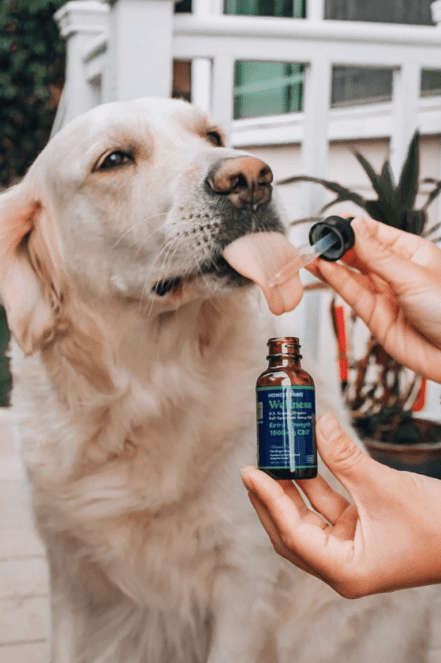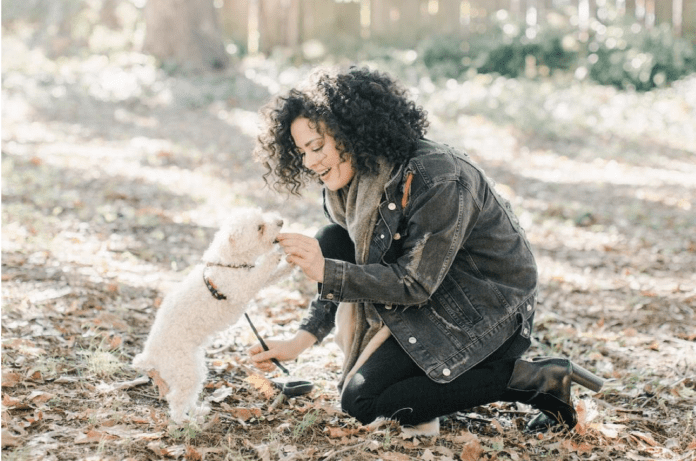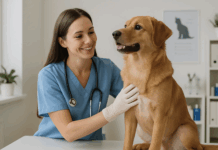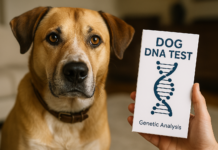Last Updated on April 11, 2023 by Dogs Vets
How to Properly Dose CBD Products for Pets
For a long time, people thought CBD was only meant for humans.
Pet owners are usually very cautious about what they feed their animals. Who can blame them? With time the introduction of pet lines containing cannabidiol started hitting the market, piquing the interest of people with animals.
Like people, animals suffer from various issues like anxiety, post-surgical pain, stress, loss of appetite, cancer, and many more illnesses.
If the logic applies, CBD should help relieve these negative symptoms in them just like it would in humans. The following is a breakdown of all the important information regarding the use of cannabis by-products in animals, including the dosage.
Benefits of Using CBD for Pets
As mentioned, there are several benefits to using CBD for humans. One of the first things pet owners research is how safe cannabidiol products are for their animals.
After that, they look at an overview of the Best CBD Products for Pets from AskGrowers – https://askgrowers.com/blog/overview-of-the-best-cbd-products-for-pets-what-are-they-and-how-to-choose-them or any other sites they trust. How beneficial would these products be for their animals, though?
The interaction between animals’ bodies and cannabidiol is similar to human beings. The animal’s endocannabinoid system interacts with the compound, regulating various body processes. This regulation then translates to better-functioning systems in general.
Some of the remarkable benefits that veterinarians and users can agree on include the following:
Increase in Appetite
Dogs, cats, and even horses can lose their appetite for several reasons. Illnesses are one of the major causes as they can get lethargic hence refusing to eat.
In managing the same, CBD increases their appetite and reduces symptoms such as nausea and lethargy. When given in the right amounts, the effects can be seen within a small duration of time.
Reduction of Anxiety
If you didn’t know this yet, it is very probable for animals to experience anxiety. It is a common condition that results in other symptoms as well.
According to ABC Everyday, animals can suffer anxiety due to several reasons. The top three are environmental changes, loud noises, and separation from their owners. How to know your animal has anxiety?
There are certain signs and symptoms that you can look out for to identify whether your cat or dog is suffering from anxiety.
The common ones include barking at dogs, self-harm, ruining the furniture, shivering, not eating, constant urinating, cowering in the corner, and others.
It is important to note that one of the symptoms alone or a couple do not mean your pet has anxiety. It is always better to consult a veterinarian to understand the symptoms’ full extent.
Pain Management
Other than anxiety and a reduced appetite, the other common benefit of CBD for animals is in treating pain. Research shows that the application of this cannabidiol can help in the treatment of arthritis in older dogs, reduce cancer pain, and so much more.
Its interaction with their endocannabinoid system reduces pain, evident when they start moving around. Even pets with arthritis can be seen moving around after a few uses of the infused products.
Improvement of the Immune System
Besides simply helping manage symptoms, CBD can also improve the general immunity of animals. This phenomenon works by the compound reacting with the brain and the body’s neurotransmitters.
In turn, this helps improve their immunity system, which protects them from contracting common illnesses.
Which CBD Products Are Safe for Pets?
As you may well know, there are various CBD products, and this does not apply to human beings alone. Dogs, cats, and even horses can use several types of products with cannabidiol. The most commonly available ones include oils, tinctures, treats, and chewable. Which of these is safe?
The safest way to administer cannabidiol products to animals is by adding them to their food. In most cases, animals may oppose administering oils and tinctures orally. With large dogs, you can add oil to food or drinks to avoid the scuffle of oral feeding.
The availability of edibles in the form of chewable treats makes it easier since dogs and cats do not refuse treats. Some of these edibles have ingredients and flavors that make the animals more susceptible to eating them.
For instance, some chews have peanut butter flavors, meaty flavors, and anything else to entice the pets.
Comprehensively, all products with CBD are safe for animals. These products do not contain THC, as the compound harms pets. CBD, on the other hand, is safer, and for a product to get sold on the market, the law requires it to contain less than 0.3% of THC.
Regardless, it is better to check the product description to ensure your dog or cat is not allergic to any ingredients.

How to Properly Dose CBD for Pets
For many pet owners, the big question is how to dose CBD for their dogs and cats properly. Some consult their veterinarians to ensure that they know the right amounts.
Others search the internet for articles like these to gain as much information as possible. Regardless of where you turn, one of the most important things to know is that different animals require different doses for cannabidiol to be effective.
Certain things matter in the administration of CBD: your pet’s size and weight, the issue you want to combat, and the potency of whichever product you are feeding them. With these three factors in mind, you can estimate the best dose that will not result in you harming your dog or cat.
For small dogs that weigh between 20 and 40 lbs, it is best to start with a 0.5mg dose and keep adding on to see how it affects your animal. With that dog size, you can keep adding the same amount if the initial dose is ineffective.
To be on the safer side, it is better to wait a couple of hours after each dose to see if they work.
For larger dogs, the appropriate dose is about 0.5 mg per 10 lbs of the animal. This calculation would mean that for an animal weighing 50 lbs, the right dose is around 2.5mg. Similar to the application with smaller dogs, you can increase the dose from now on.
One of the major ways to ensure your dog’s safety is to increase the dosage by 0.5mg after an hour or two of the effects not showing.
With cats, the recommended dose is 0.1mg which can be increased if the pet does not improve. On the other hand, horses can use from 2mg to 4mg, depending on the animal’s size.
In case of an overdose, which is possible, it is advisable to give the animal a lot of water and let it rest. If the symptoms persist, then it is safer to see a veterinarian.
All pets’ signs of an overdose include lethargy, vomiting, diarrhea, and more. When starting on CBD, it is always better to keep a close watch on your animal so that you can know when they are experiencing any side effects.
Key Pointers to Introducing CBD for Pets
While introducing CBD to your furry friends can be easy, it is always important to approach the matter cautiously. The following are some pointers that you can use to facilitate the use of cannabidiol for cats, dogs, and horses.
- Ensure you are consistent with feeding the products to your animals.
You are more likely to get the best results if you are consistent with the administration of your products. Even if you do not see the needed results initially, the positive effects will show as your dog or cat gets used to CBD.
- Start with small doses and increase as needed.
As mentioned, starting small and increasing the dosage as you go is always better. Starting with a high dose will risk your animal suffering from negative side effects.
- Read the products’ ingredients carefully.
With each pet being different, what may benefit one can be fatal for another. As an owner, reviewing the product descriptions to get the safest one for your animal is always advisable.
- Consult a veterinary doctor at any stage you feel confused.
Your vet should be on speed dial as you start on CBD. You can call them if anything goes wrong or have any questions.
Conclusion
One of the most difficult aspects of introducing CBD to your furry friends is deciding how much to give them. While vets can offer the information on a visit, you can also get the same from online articles like these.
The size of your dog, cat, or horse matters in determining the dose. The best way to proceed is to choose edibles and start the animal on small doses. Regardless of the online information, it is helpful to consult a vet if anything goes wrong.
The contents of this article are the work of Denys Svirepchuk of AskGrowers. With this and other published works, he intended to offer much-needed information to individuals with animals seeking to explore the CBD world. With this in mind, he provided information that was extensive and useful.
Fact Check
We hope you enjoyed reading this article. What are your thoughts on the topic?
“At [Dogsvets.com], our goal is to bring you the most accurate and up-to-date information on all things pet-related.
If you have any additional insights or would like to advertise with us, don’t hesitate to get in touch.
If you notice any errors or discrepancies in our content, please let us know so we can correct them.
We welcome your feedback and encourage you to share this article with others.”























